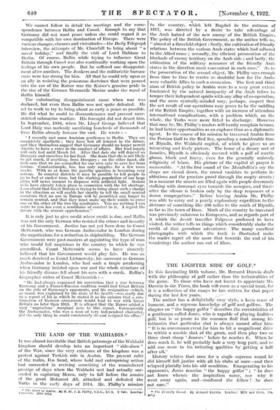THE LAND OF THE WAHHABIS.* IT was almost inevitable that
British patronage of the Wahhabi kingdom should develop into an important " side-show " of the War, since the very existence of the kingdom was a protest against Turkish rule in Arabia. .The present ruler of the realm, Ibn Saud, whose bold and enterprising action had succeeded in reviving something of the remembered prestige of days when the Wahhabi sect had actually suc- ceeded in capturing Mecca, only to fall before the armies of the great Mohamet Ali, attacked and defeated the Turks in the early days of 1914. Mr. Philby's mission • The !lead of Arabia. By B. St. J. B. Philby, C.I.E. I.C.S. 2 Avis. London: Constable. (63a. net.] to the country, which left Bagdad in the autumn of 1917, was directed by a desire to 'take advantage of the Arab hatred of the new enemy' of the 'British Empire. The policy of the British Government, as the author tells us, " aimed at a threefold object : firstly, the cultivation of friendly relations 'between the various Arab states which had adhered to the Allied cause ; secondly, the efficient prosecution of the blockade of enemy territory on the Arab side ; and lastly, the utilization of the military resources of the friendly Arab states in the direction most convenient in each case." As to the prosecution of the second object, Mr. Philby says enough from time to time to render us doubtful how far the Arabs were valuable Allies in such a connexion. The first and third aims of British policy in Arabia were -to-a very great extent frustrated by the natural incapacity of the Arab tribes to temper their independent spirits with any allorof co-operation, and the more cynically-minded may, perhaps, suspect that the net result of our operations may prove to be the saddling of the British Empire, together with an increase of attendant international complications, with a problem which, on the whole, the Turks were more fitted to discharge. However that may be, Mr. Philby's readers will hardly complain because he had better opportunities as an explorer than as a diplomatic agent. In the course of his mission he traversed Arabia from the Persian Gulf to the Red Sea, spending a considerable time at Riyadh, the Wahhabi capital, of which he gives us an interesting and lively picture. The home of a dreary sect of fanatics, Riyadh is obviously covered with a pall of ascetic gloom, black and heavy; even for the generally unlovely religiosity of Islam. His picture of the capital at prayer is memorable. "At the first sound of the Illuadlulhin's cry the shops are closed down, the crowd vanishes to perform its ablutions and the proctors prowl through the empty streets ; in a moment the streets arc filled again with people decorously stalking with downcast eyes towards the mosques, and there- after the silence is broken only by the deep responses of a dozen congregations." Before leaving Arabia Mr. Philby was able to carry out a purely exploratory expedition to the distance of something like 500 miles to the south of Riyadh, as far as the town of Dam. Much of the country he traversed was previously unknown to Europeans, and as regards part of it which the Jesuit traveller Palgrave professed to have visited, the writer tells us things which considerably shake the credit of that garrulous adventurer. The many excellent photographs with which the book is illustrated make the reader regret all the more that towards the end of his wanderings the author ran out of films.






































 Previous page
Previous page